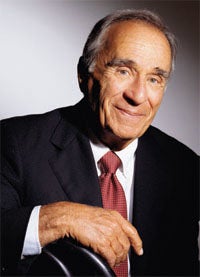 As Sidney Harman continues his search for a new Newsweek editor — a day after deal talks with Barry Diller and Tina Brown broke down — a new wrinkle in the Newsweek saga emerged:
As Sidney Harman continues his search for a new Newsweek editor — a day after deal talks with Barry Diller and Tina Brown broke down — a new wrinkle in the Newsweek saga emerged:
Who pays for Newsweek if Harman dies?
The audio equipment magnate is currently financing the magazine to the tune of tens of millions of his own money.
But if he were to die, would his heirs be willing to do the same?
That's not clear.
And that leaves the already-uncertain fate of the magazine even less certain.
According to an insider with knowledge of the deal, the Washington Post Company required Harman to commit to a funding plan in the case of his own demise before agreeing to sell him the magazine. (Harman agreed to buy Newsweek in August for $1.00 plus the assumption of the magazine’s heavy debt.)
Despite this commitment, the source said, no such plan currently exists.
A spokesman for Newsweek did not return an e-mail seeking comment.
If true, though, that would mean Harman is essentially running this magazine from his own bank account, and there is no contingency plan for Newsweek without him. Furthermore, there is no guarantee that Harman’s would-be heirs — his wife, Jane Harman, or their two children — would continue to pour in the millions currently necessary to keep Newsweek afloat.
Harman has told insiders that he is prepared to lose some tens of millions of dollars funding Newsweek in the short term. But he has already managed to cut Newsweek’s losses through draconian cuts in spending — and talent has been fleeing the place on its own.
The magazine was on track to lose about $30 million this year, but layoffs and other cutbacks instituted by Harman — which had long been expected, regardless of who wound up buying the magazine — have cut that figure to about $20 million.
Meanwhile, Harman is not mourning the death of the potential Newsweek-Daily Beast deal. According to WWD, his focus now is on luring well-regarded Sports Illustrated editor-in-chief Terry McDonell to the ailing newsweekly. According to the New York Post, Harman had already approached New York editor-in-chief Adam Moss and Fairchild editorial director Peter Kaplan about the top job, but Moss and Kaplan are staying put.
It's worth noting that Harman has shown no signs of slowing down. "[He] seems unwilling and unready to have a quiet retirement," the New York Times noted at the time of the Newsweek sale. "He started a business selling FM radios in the 1950s and built it into one of the largest audio equipment companies in the world, stepping down as the chief executive of Harman International Industries at age 88. He has continued to teach a business class at the University of Southern California and has said that when he plays golf, he walks all the way through 18 holes, and occasionally more."
Sharon Waxman contributed to this story.


